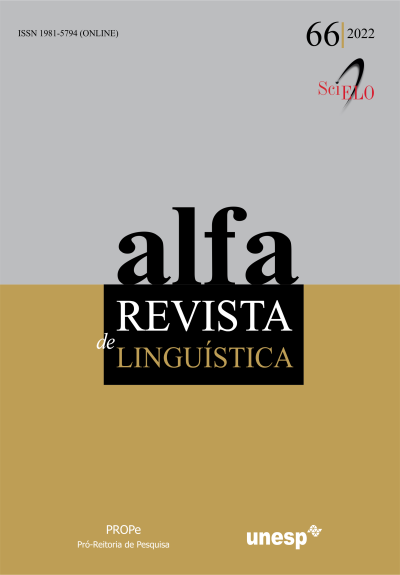A concepção de tema nas obras do círculo de Bakhtin
DOI:
https://doi.org/10.1590/1981-5794-e14491Palavras-chave:
Tema, círculo de Bakhtin, sentido total da enunciação, relação entre significação e valoração, objeto da enunciaçãoResumo
O estudo da significação é uma das problemáticas mais complexas da Linguística, segundo os pressupostos de Bakhtin e do Círculo. Nesse ínterim, o tema, um dos conceitos-chave, embora não seja o mais estudado pelo Círculo, torna-se essencial para a compreensão da linguagem como ação concreta. Este artigo, de escopo bibliográfico, objetiva discutir, epistemológica e teoricamente, a concepção de tema e os conceitos a ele relacionados nos trabalhos do Círculo, especificamente, Bakhtin, Volochínov e Medviédev. Para tanto, o texto retoma as considerações a respeito do tema nas obras desses autores, a observar seu desdobramento, no decorrer dos anos. Os resultados apontam que há variações, nos textos, em relação ao conceito, o que possibilitou depreender algumas tendências em seu entendimento: (1) tema como o sentido total da enunciação, o acontecimento, a realidade e o momento no qual, axiologicamente, interagem conteúdo e forma; (2) tema como a relação entre significação e valoração do signo ideológico; e (3) tema como objeto da enunciação/ do enunciado.
Downloads
Downloads
Publicado
Como Citar
Edição
Seção
Licença
Copyright (c) 2022 ALFA: Revista de Linguística

Este trabalho está licenciado sob uma licença Creative Commons Attribution 4.0 International License.
Os manuscritos aceitos e publicados são de propriedade da Alfa: Revista de Linguística. É vedada a submissão integral ou parcial do manuscrito a qualquer outro periódico. A responsabilidade do conteúdo dos artigos é exclusiva dos autores. É vedada a tradução para outro idioma sem a autorização escrita do Editor ouvida a Comissão Editorial.

